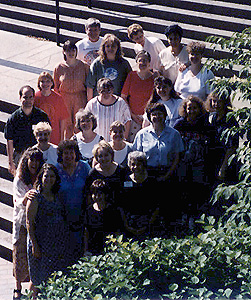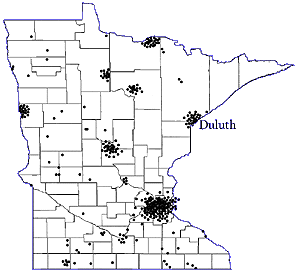POLIA Train-the-Trainer Program
Meeting the Challenge of World Class Language Standards through Proficiency Oriented Language Instruction and Assessment
Purpose of the ProgramThis program has provided intensive professional development training to world language teachers across the state of Minnesota in proficiency-oriented language instruction and assessment (POLIA) in order to meet challenging new state standards. Teachers, selected in cohorts of twenty-five per year, have become trainers in their own right through the year-long course and, working in teams, have delivered workshops to world language teachers in their districts and in neighboring districts. The program was funded by an Eisenhower Professional Development Program, Public Law 100-382 grant administered through the Minnesota Higher Education Services Office. The program was coordinated by the Center for Advanced Research on Language Acquisition at the University of Minnesota. |
 |
Program Overview
Teacher-trainers selected for this program participated in a summer institute and three two-day workshops throughout the year in order to gain in-depth knowledge about proficiency-oriented instruction, national and state world language standards, and performance-based assessment. Through this training, participants received preparation as POLIA trainers to deliver workshops designed to assist fellow world language teachers in meeting new state standards. Working as part of a team, each POLIA trainer had the goal of reaching at least fifteen world language teachers, to further provide an opportunity for other world language teachers. In the first year of the program (1997-1998), over four hundred world language teachers participated in a POLIA-sponsored workshop.
For the second year of the program (1998-1999), the program model was expanded to include the development of a mentor-trainer component. In addition to the new cohort of twenty-five POLIA trainers, six POLIA trainers who participated in the 1997-1998 POLIA training program were selected to act as mentor-trainers. The mentor-trainers served as resources for the new trainers and assistants to the program director, Professor Diane Tedick, throughout the year. As mentor-trainers, they further developed their knowledge of standards, proficiency-oriented instruction and performance-based assessment, and also fine-tuned their leadership/group facilitation skills in order to improve their ability to act as consultants for the expanding POLIA "best practices" network. POLIA trainers in the second year of the program delivered training to 300 world language teachers in Minnesota, Oregon, Indiana, and Mississippi.
History of the Program
The program grew out of the work of the Minnesota Articulation Project (MNAP). The products developed as a result of the collaboration between MNAP and CARLA include a battery of proficiency-based assessments for reading, writing, and speaking in French, German, and Spanish, and the MNAP's Proficiency-Oriented Language Instruction and Assessment: A Curriculum Handbook for Teachers. Response to these resources has been very positive throughout the state and across the nation. These tools served as the instructional base for the POLIA training program and complement the tools being developed in response to the state world language standards.

Program impact of the Minnesota Articulation Project and POLIA program
The Program Model
The POLIA program model begins with a one-week intensive summer workshop which enables participants to understand and internalize the theoretical principles linking national and state standards with proficiency-oriented language instruction and assessment. The program also helps teachers develop practical skills in creating and adapting curriculum materials and assessment tools following these principles. Participants become well versed with the National and State standards frameworks and develop ways to lead the language teachers in their district through the process of shifting their instructional approach to meet these challenging new standards.
During the fall, participants practice these instructional strategies by using the task/activities and the assessment tools they develop during the summer workshop. Participants meet in late fall for a two-day workshop, at which they get in-depth feedback on their reports of classroom use of the curriculum materials and piloting of assessment tools. They also start to develop their own set of training materials for use in delivering inservices to their home school districts, and begin the process of setting up workshop dates for their own and neighboring school districts.
During the early winter, participants continue to pilot and refine the proficiency-oriented materials they present to their students and make necessary adaptations to their text materials. Participants work on customizing their training materials during a two-day workshop in mid-winter, and they conduct mock training sessions with each other in order to practice their presentations and receive feedback in a group setting.
Throughout the spring, teams of POLIA trainers deliver workshops for K-12 foreign language teachers. Each trainer's goal is to have an impact on at least fifteen teachers. At the final POLIA training workshop, held in late spring, participants report on the inservices they have conducted, and refine their training materials based on their experiences and on feedback from the group.
At the conclusion of the program, POLIA trainers are available as ongoing resources within the state and beyond. Many continue to be linked to programs within CARLA as part of the ongoing development of a "best practices" network of world language teachers.
Benefits to Participants
Participants in this program receive in-depth training on the national and state standards, proficiency-oriented language instruction, and performance-based assessment. Throughout the year-long program, participants:
- become familiar with the National and Minnesota Standards frameworks and develop ways to help districts implement these standards in their world language curriculum;
- learn about the theoretical principles underlying proficiency-oriented language instruction and curriculum development;
- understand and internalize the theoretical principles so that they guide their curriculum development and instructional practices;
- learn how to align assessment with curriculum and instruction;
- learn ways of developing formative assessment for classroom use that align with proficiency-oriented language instruction;
- gain hands-on, practical experience in developing and critiquing proficiency- and context-based assessments in the various modalities;
- receive feedback and guidance during the creation and development of proficiency-based assessments;
- gain a sound theoretical and practical foundation for scoring and evaluating assessments they have developed;
- develop skills linking their assessments with classroom practice and with national and state performance standards; and
- gain experience training other foreign language teachers to develop proficiency-based assessment.
For more information about this program, contact the CARLA office at carla@umn.edu or Professor Diane Tedick at djtedick@umn.edu.
